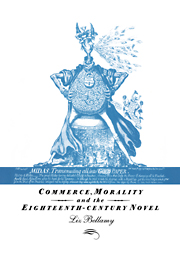7 - The jacobin novel
Published online by Cambridge University Press: 18 December 2009
Summary
The sentimental novel celebrated a code of conduct which it represented as culturally marginal and even cranky. As such, it could be taken as a sign that the novel had surrendered the claim, implicit in mid-century fiction, that the genre had a crucial didactic and representational function, as a form that embodied the aspirations of society. Sentimental novelists did not attempt to portray the public virtue that had been the essence of epic, and even the private virtue they conveyed was recognised as irrelevant to the economic structure of the state. Its didactic function was increasingly fulfilled through the operation of a moral subtext that was designed to appeal to the emotions of a refined elite. As John Mullan argues, it is a type of writing which ‘does not so much recommend correct conduct to its readers as assume virtue in their capacity to understand the sentimental text’. In the 1790s, however, the situation changed. A new form of fiction developed which attempted to reinvest the novel with a central public and political role and to reclaim some of the didactic and social functions which had been ceded with the triumph of sentimentalism. Both radical and conservative writers sought to assert the political centrality of individual morality, and to highlight the role of fiction as an important locus for ideological debate. The novel therefore became polemicised and the debate over public and private morality was repoliticised.
Information
- Type
- Chapter
- Information
- Commerce, Morality and the Eighteenth-Century Novel , pp. 157 - 181Publisher: Cambridge University PressPrint publication year: 1998
